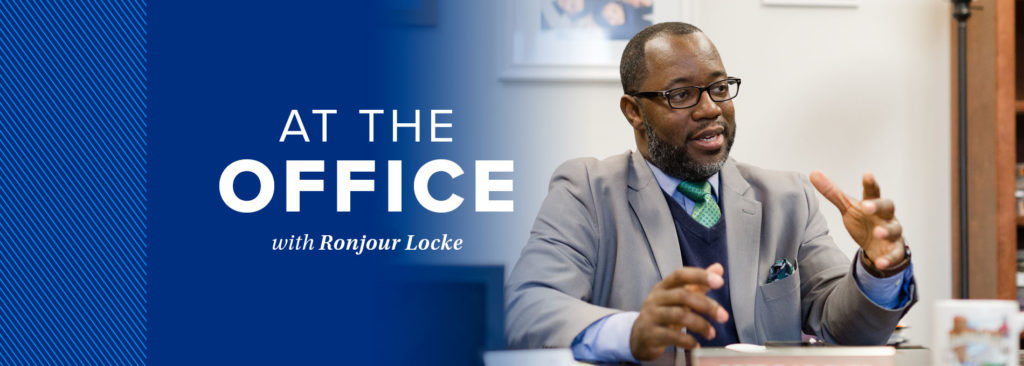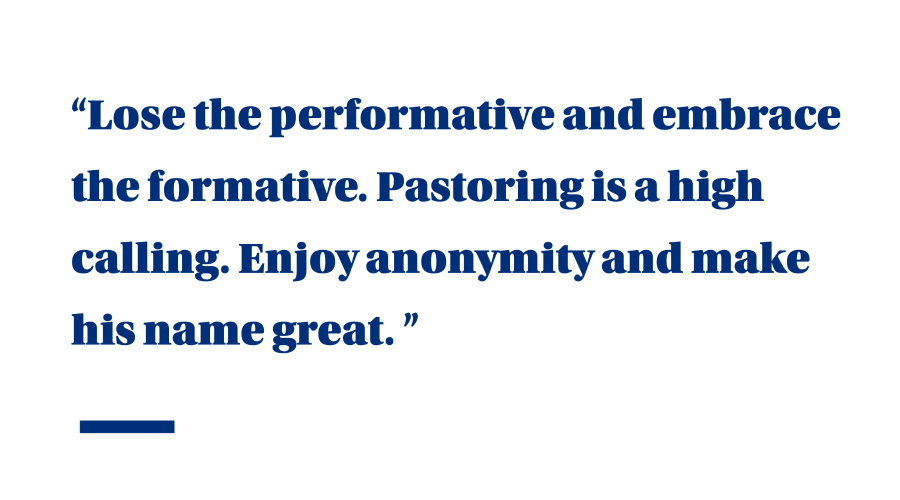At the Office with Ronjour Locke
Lauren Pratt | August 09, 2021

Ronjour Locke has seen pastoral ministry from many different angles. He and his wife, Annie, have ministered to those living in the bustling city of Baltimore.
They’ve served communities in Fort Worth. Now they find themselves serving in the quaint and quiet town of Wake Forest at Southeastern Baptist Theological Seminary. While Locke has ministered in a number of communities, he will quickly tell you that true leadership means to first become a servant, just as Christ modeled for his followers. It’s in this kind of leadership, devoid of status, that believers find true life and joy, because at its core we find Christ himself.
As an instructor of preaching and urban ministry, and as Director for the Center for Preaching and Pastoral Leadership, Locke is equipping future pastors to serve incarnationally to the overlooked and underserved. In a brief conversation, Locke took some time to discuss meaningful items around his office, his favorite pastimes and advice to future and current pastors.
What items do you keep around your office?
Most of the things in my office are stories of my life—where we’ve gone, experiences that we’ve had. There are pictures of the kids—Joshua, Noah, Mikaiya and Naomi. There’s a picture of Annie and my first dance. I tell her to this day that is my absolute favorite picture of her. When I was pastoring, a lady in our church made that six-string guitar neck on the wall. Another thing about me is I like to play guitar. I’ve played since high school. There are also little things that the kids have given like the plaque that says, “Greatest Dad Ever” and the card that says, “You are the bacon of dads.” I have a mug collection from all of the seminaries I’ve been to, some things to remind me of our church in Baltimore and things from travels to Israel like an oil lamp and a crown of thorns.
What do you and your family like to do when you have some free time?
We love hanging out. Annie will make a whole lot of popcorn and we’ll watch some movies. The kids also love doing plays and concerts. They’ll take paper, cut it up and make tickets for us. We’ll sit there and we’ll watch them. The girls will do some type of dance or ballet. Or, they’ll write a new song and play it for us. It’s never a dull moment in the Locke house.

What was unique about pastoring in Baltimore versus other areas where you’ve served?
One of the things that I had to learn was if we’re going to do ministry in Baltimore, we’re going to have to do ministry for the whole person. If we’re going to do ministry in Baltimore, we’re going to have to think not just about the whole person but about the whole context. A lot of people are in survival mode, and when you’re in survival mode, you don’t really think about loving your neighbor as yourself because you’re trying to survive. You’re not thinking about taking the gospel to the nations. You’re trying to get through tomorrow. If I want to get to that point where we’re making disciples and sending them off to the nations, we’ve got to make sure that we establish the building blocks of structure in order for that to happen. That meant we had to care about the whole person. Discipleship looks different in that context. Church looks different in that context.
What advice would you give to current and future pastors?
I think we have the temptation of turning the local church into a platform. It has so permeated our thinking and our culture that it’s maddening. The pastor is looking at this not as a formative position but as performative. Lose the performative and embrace the formative. Pastoring is a high calling. Enjoy anonymity and make his name great.
What has been one of the most formative lessons you’ve learned in ministry up to this point?
Obscurity, humility and being a nobody are much closer to Christ’s vision of ministry than what’s typically marketed. That has been the biggest lesson that I’ve learned in ministry. When we lay down our lives—when we lose ourselves—we’ll find that the Lord is so relentlessly faithful. This is why we go to hard places. This is why we go to hard people. This is why we go toward the drama and the danger instead of away from it—because the Lord is there.
What are some resources you would recommend to students wanting to go into pastoral ministry?
“The Cross Before Me: Reimagining the Way to the Good Life” by Brian Gregor and Rankin Wilborne
“Delighting in the Trinity” and “Rejoicing in Jesus” by Michael Reeves
*This article was edited for length and clarity and originally appeared in our Fall 2020 Southeastern Magazine.
*To learn more resources and events from our Center for Preaching and Pastoral Leadership, visit pastorscenter.org.
